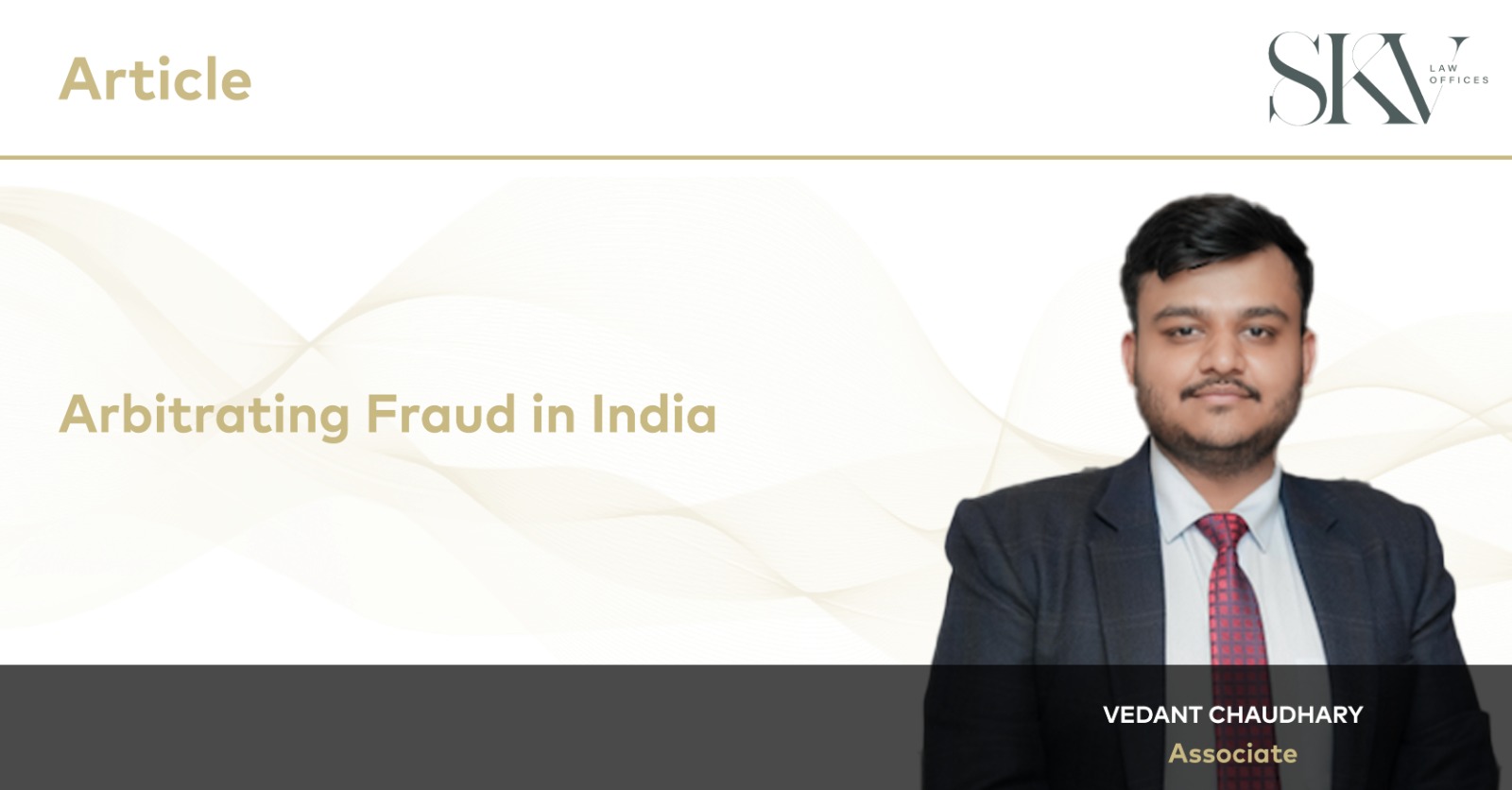Arbitrating Fraud in India
23.05.2024
Authored by: Vedant Chaudhary, Associate
Introduction
There has been extensive examination by the judiciary and academic discourse regarding the ability to resolve disputes related to fraud through arbitration in India. The arbitrability of disputes determines which disputes can be resolved through arbitration instead of being brought to court. It is particularly crucial when dealing with fraud, as there are frequently complex factual and legal matters involved.
Disputes related to fraud inherently encompass both personal rights and property rights. The existing body of legal precedents illustrates the complex manner in which the issue of whether fraud can be resolved through arbitration has been addressed. Furthermore, it has been burdened with several tests that heighten the probability of judicial intervention. It is not possible to differentiate between simple fraud and complex fraud in a reasonable manner because arbitrators have the authority, as stated in Section 27 of the Arbitration and Conciliation Act, 1996 (“1996 Act”) to seek help in documenting evidence.[1]
The Law Commission, in its 246th Report, suggested modifying Section 16 of the 1996 Act to incorporate sub-section (6), which would empower the Tribunal to issue an award in cases involving allegations of fraud. This would ensure that the parties retain the right to raise the issue of arbitrability before the arbitrator during the pre-award phase.[2]
Navigating the Legal Case
In the case of Abdul Kadir Shamsuddin Bubere vs. Madhav Prabhakar Oak,[3] The Indian Supreme Court ruled that if serious allegations of fraud were made against a party and the party charged with fraud requested that the matter be tried in open court, the court would be justified in refusing to order an arbitration agreement to be filed.
The problem was further complicated by the Supreme Court’s decision in N. Radhakrishnan v Maestro Engineer[4]. There are multiple reasons why this decision was incorrect, one of which is that it goes against the established principle that Section 8 is obligatory.
However, in the case of ‘Swiss Timing v Organising Committee, Commonwealth Games 2010,’[5] the N Radhakrishnan case was critiqued and declared per incuriam. The Supreme Court’s decision in Booz Allen and Hamilton Inc v SBI Home Finance Ltd[6] laid down the foundation to determine whether a dispute would be amenable to arbitration or not. It was determined that if a dispute involved a right in rem, it would not be arbitrable, whereas a dispute concerning a right in personam would be arbitrable.
The test for determining the seriousness of fraud was developed in the case of A Ayyasamy v A Paramasivam & Ors,[7] in which the Supreme Court clarified the distinction between fraud simpliciter and serious fraud, and held that a mere allegation of fraud by one party against the other cannot be used to conclude that a matter is not arbitrable.
In 2019, the Supreme Court, in the case of Rashid Raza v. Sadaf Akhtar,[8] established a dual criterion for identifying a complex fraud. Firstly, it examines whether the fraud affects the entire contract, including the arbitration agreement, to the extent that it becomes invalid. Secondly, it considers whether the allegations of fraud pertain to the internal matters between the parties involved and have no impact on the public domain.
In 2021, the Supreme Court, through a Single Judge Bench, reaffirmed the prevailing stance in current arbitration law that the civil component of fraud can be resolved through arbitration, except in cases where the fraud fundamentally undermines the main contract and challenges the validity of the arbitration clause. It was explicitly stated that the criminal aspect of fraud, which carries penalties and criminal sanctions, can only be resolved by a court of law. This is because it may lead to a conviction, which is a matter of public law.[9]
In the case of Nilesh Shejwal v. Agrowon Agrotech Industries Pvt. Ltd, [10] the Bombay High Court ruled that issues that can be resolved through arbitration, as stated in the contract, can be decided upon, even if there are ongoing criminal proceedings related to the same matter.
Conclusion
Indian courts are currently discussing whether fraud can be resolved through arbitration. Allegations of significant fraud may provide a valid reason to avoid arbitration, whereas less complex fraud cases can still be subject to arbitration. The purpose of this distinction is to encourage the use of arbitration while also preventing its abuse in cases involving serious crimes. A recent revision permits the questioning of arbitration awards on grounds of fraud, while discouraging the submission of false allegations. Notwithstanding these measures, explicit regulations are necessary to resolve the perplexity.
[1] Section 27 of 1996 Act.
[2] Law Commission of India, Report No. 246 on Amendments to the Arbitration and Conciliation Act, 1996 (2014)
[3] 1962 AIR 406
[4] (2010) 1 SCC 72
[5] AIR 2014 SC 3723.
[6] (2011) 5 SCC 532.
[7] (2016) 10 SCC 386
[8] (2019) 8 SCC 710.
[9] N.N. Global Mercantile Pvt.Ltd. vs. Indo Unique Flame Ltd., 2021 SC OnLine SC 13.
[10] Commercial Arbitration Petition No. 14 of 2022.


